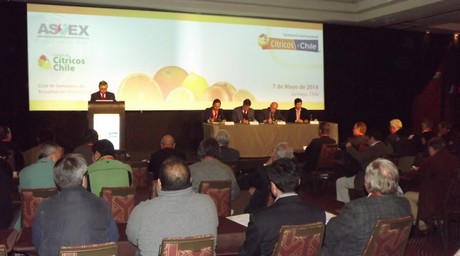 ternational Citrus Seminar, which was attended by more than two hundred and fifty producers and exporters, among other national and international actors of the citrus sector, was held on Wednesday April 7th. The event organized by ASOEX is part of the Commercial Technical Update Seminar Series for the major Fruit Export Species and was sponsored by major suppliers of the fruit industry.
ternational Citrus Seminar, which was attended by more than two hundred and fifty producers and exporters, among other national and international actors of the citrus sector, was held on Wednesday April 7th. The event organized by ASOEX is part of the Commercial Technical Update Seminar Series for the major Fruit Export Species and was sponsored by major suppliers of the fruit industry.The national director of the SAG, Angel Sartori, the deputy director of ProChile, Ignacio Fernández, the president of ASOEX, Ronald Bown, and the chairman of the Chilean Citrus Committee, Juan Enrique Ortúzar, led the opening ceremony.
"The current export season has been, undoubtedly, one of the most complex that our industry has faced, as a result of the frosts in September 2013, the severe drought in several of the northern and central regions of the country, and the port shutdowns. The citrus industry is not indifferent to these issues, and therefore, this kind of events provides us with an opportunity to learn about them and make better decisions," said Ronald Bown during his inaugural address.
The union leader added: "We are working closely with the public sector to enhance our citrus exports. For example, we are negotiating tariff reductions in Korea and Japan, opening the Mexican market for our limes and our clementines, for which we are negotiating their income without a fumigation process. Additionally, we are close to achieving authorization for our entire citrus portfolio into the Brazilian market, which we hope will be formalized within the next few weeks. Likewise, starting July 1, we will make the SimFRUIT portal, which makes the sector's official information available for the industry once again, in a timely manner, ."
Angel Sartori, national director of the SAG, said: "The commitment that the SAG, the President and the Minister of Agriculture have is to work actively with the private sector for the development of the country. As such, we will be opening a new site inspection, through which the exports of Chilean fruits, especially citrus, will be able to be exported with a certification, in the city of Coquimbo next Monday."
In turn, Ignacio Fernandez, deputy director of ProChile, stated: "ProChile aims at working hand in hand with the trade associations and the country's regions so it makes us very happy to be at this seminar. Moreover, we've been working with ASOEX and the Fruit Committees for years, and this new administration wants to strengthen and improve this job."
The sector's situation and outlook
During his presentation, Juan Enrique Ortúzar, president of the Chilean Citrus Committee, said that the entity groups are nearly 75% of the country's citrus exports and stressed the importance of their work is to coordinate promotions, position the national citrus abroad, and support the authorities' and ASOEX's defence and opening of markets had.
The representative also reported on the development of Chile's fruit industry, which in 2013 recorded exports for U.S. $185 million (FOB). In this regard, Ortúzar said: "Our industry has grown significantly in the last ten years, especially because of the increase of cultivated areas and species produced, where it's important to highlight the increase of the mandarin sector, with about 6,000 hectares. Oranges and limes, in general, have had a slight growth due to the renewal of the orchards."
According to estimates by the Committee, the cultivated area (hectares) in 2013 by species was: mandarins, 6,393 acres; limes, 7.475; oranges, 7,458; and grapefruit, 291.
Manuel José Alcaino, director of Decofrut, said that, despite the low volumes forecast, the Chilean citrus export season had good prospects in the U.S. market, their main target, because of the frost in California during the month of December 2013 that affected the U.S. production of mandarins (-32 %), oranges (-30%) and limes (-20 %).
"The Chilean citrus season will start with a partially undersupplied market, which is an opportunity that has to be well managed by the sector, mainly to consolidate retail programs. If we approach this wrongly we might lose the ability to reach agreements and leave the door open for others to reach them."
Regarding this season's total national citrus export estimates, Alcaino said that, as a result of the drought that has affected the production areas, the mandarin and clementine exports would decrease by 4 %, amounting to 61,046 tons, and that orange exports would fall by 10%, to 67,028 tons.





